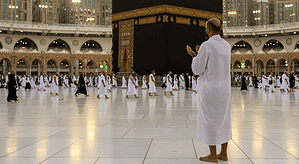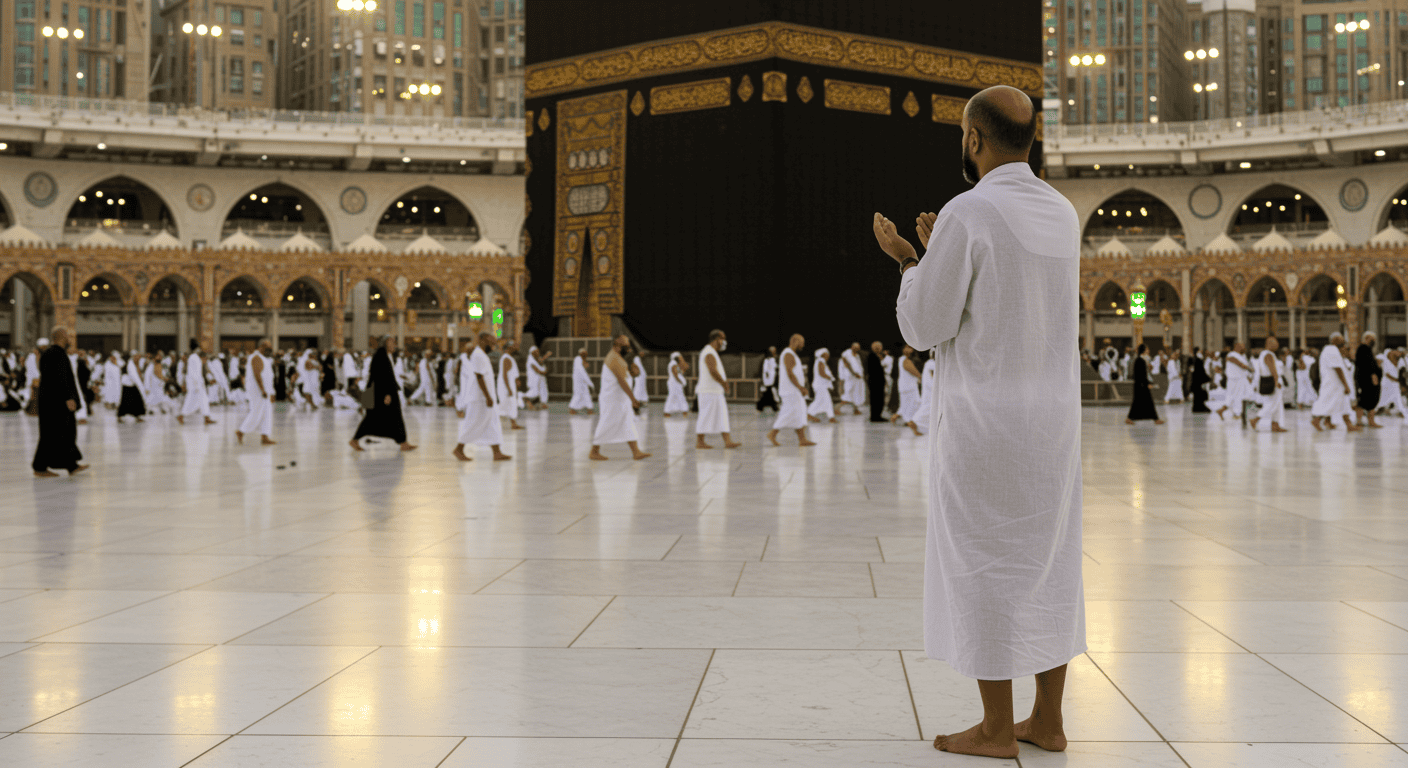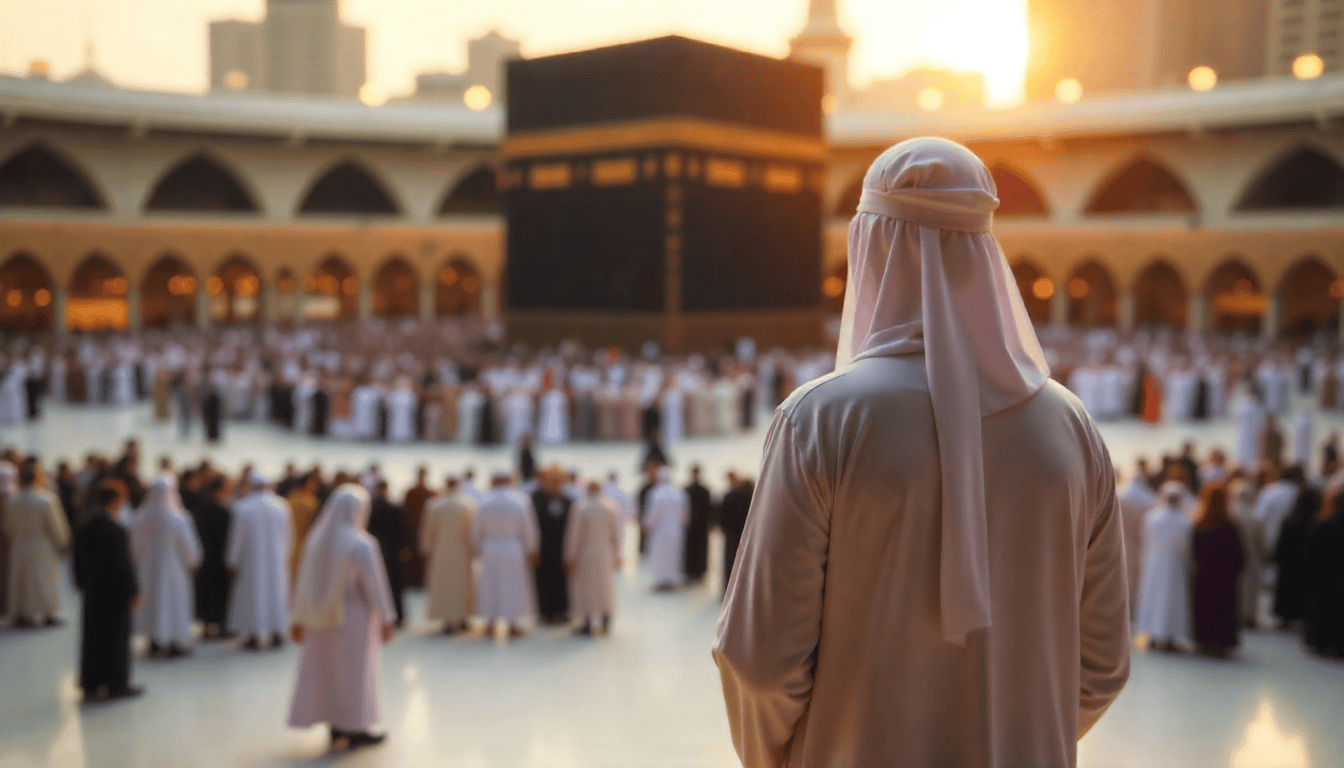Many pilgrims unintentionally make errors while in Ihram. Some do not fully understand its spiritual meaning, while others overlook practical fiqh (Islamic jurisprudence) details. The goal of this guide is to explain the common Ihram mistakes and provide simple, practical advice on how to avoid them. Whether you are performing Hajj or choosing one of the Ramadan Umrah Packages for your spiritual journey, this guide can help you maintain the sanctity of Ihram throughout your pilgrimage.

Ihram Mistakes to Avoid: A Practical Fiqh Guide
Home / Ihram Mistakes to Avoid: A Practical Fiqh Guide

Umrah Guide, Umrah Insights
October 19, 2025
Ihram Mistakes to Avoid: A Practical Fiqh Guide
The sacred state of Ihram is one of the most important parts of Hajj and Umrah. It represents purity, humility, and equality before Allah. When pilgrims wear the Ihram, they enter a state where certain actions become prohibited, and every act must reflect sincerity and obedience. Understanding the rules of Ihram is essential because even small mistakes can lead to penalties or reduce the spiritual reward of the pilgrimage.
What is Ihram?
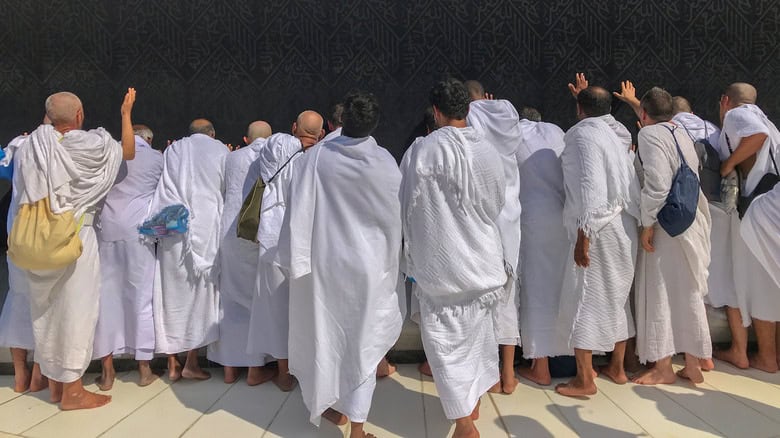
Ihram refers both to the physical garments and the spiritual state a Muslim enters before performing Hajj or Umrah. The word itself comes from the Arabic root “haram,” meaning “to make sacred.” It symbolizes a person’s commitment to leave behind worldly desires and focus entirely on worship and submission to Allah.
For men, Ihram consists of two unstitched white sheets, one wrapped around the waist and the other draped over the shoulder. Women wear their usual modest clothing that covers the body, avoiding any form of adornment. The simplicity of the Ihram clothing highlights equality among all pilgrims, showing that in front of Allah, everyone is the same, regardless of wealth or status.
The Purpose and Spiritual Meaning of Ihram
Ihram is not just about wearing white cloth; it is a spiritual transformation. The moment a pilgrim declares the intention (niyyah) and recites the talbiyah — “Labbayk Allahumma Labbayk” — they step into a sacred state. From that point onward, they must observe certain prohibitions that protect the soul from sins and distractions.
This state reminds Muslims of the Day of Judgment when everyone will stand before Allah without possessions or status. It also nurtures humility and mindfulness. Pilgrims become more conscious of their words, actions, and intentions, striving to maintain inner peace and patience throughout the journey.
The Importance of Following Ihram Rules
Understanding and following the rules of Ihram is essential because the pilgrimage is not just a physical journey but also a spiritual one. Every act in Ihram is meant to purify the heart and discipline the self. Violating these rules knowingly or unknowingly can require expiation, such as offering a sacrifice or fasting.
Moreover, the Prophet Muhammad (peace be upon him) emphasized the need to perform every step of Hajj and Umrah according to the Sunnah. A mistake in Ihram can affect the validity or reward of the pilgrimage. Therefore, learning about Ihram in advance helps pilgrims focus on devotion instead of worrying about what they might be doing wrong.
Common Ihram Mistakes to Avoid

Many pilgrims make errors simply because they are unaware of the correct procedures. Some mistakes are minor and can be forgiven, while others may require a penalty. Knowing what to avoid can make the pilgrimage smoother and spiritually more fulfilling.
The following sections explain some of the most common mistakes made during Ihram and provide practical tips to prevent them. These guidelines are based on fiqh rulings from scholars and traditional Islamic sources, ensuring that the information is both accurate and easy to apply.
Mistake 1: Entering Ihram from the Wrong Miqat
One of the first and most important rules is entering Ihram at or before reaching the Miqat, the designated boundary points around Makkah. Some pilgrims pass the Miqat without wearing Ihram, thinking they can do it later in Makkah. This is a serious mistake.
If a person crosses the Miqat without entering Ihram, they must return to the Miqat and make the intention there. If they do not return, a penalty (dam) is required. To avoid this, always prepare in advance, wear Ihram clothing before your flight or bus crosses the Miqat, and declare your intention at the correct place.
Mistake 2: Using Perfume After Entering Ihram
Applying perfume or any scented product after entering Ihram is prohibited. Many people forget this and use scented soaps, creams, or sprays out of habit. Even using perfumed wipes or deodorant can break the rule.
The correct practice is to apply perfume before entering Ihram if desired, but once the intention is made and the talbiyah is recited, no fragrance should be used. Unscented personal care products are recommended, and pilgrims should check labels carefully before packing.
Mistake 3: Covering the Head for Men or the Face for Women
Men are not allowed to cover their heads with anything that touches the scalp, such as caps, turbans, or towels. However, they can use umbrellas or shade without direct contact. Women, on the other hand, must not cover their faces with anything that touches the skin, like a niqab or veil.
Instead, women can let a loose cloth hang in front of the face without touching it if they wish to maintain modesty. Understanding these distinctions prevents confusion and ensures the Ihram remains valid throughout the journey.
Mistake 4: Cutting Hair or Nails During Ihram

One of the restrictions in Ihram is to avoid removing any hair or nails deliberately. This includes shaving, plucking, or trimming. Some pilgrims do this unknowingly or by accident when grooming.
To avoid this mistake, pilgrims should cut their nails and trim unwanted hair before entering Ihram. Once in the sacred state, they must refrain from doing so until after performing the required acts that end Ihram, such as after Tawaf and Sa’i for Umrah or after the sacrifice in Hajj.
Mistake 5: Wearing Stitched Clothing for Men
Men must wear unstitched cloths while in Ihram. Shirts, pants, or underwear are not allowed. However, wearing belts, sandals, or pins to secure the Ihram cloth is permissible as long as they do not resemble stitched garments.
This rule is often misunderstood because some pilgrims assume it refers only to visible stitching. In reality, it means avoiding tailored garments designed to fit the body. Ensuring that the Ihram sheets are worn properly and comfortably helps prevent unintentional violations.
Mistake 6: Arguing or Using Harsh Words
Ihram requires pilgrims to maintain calmness and patience. Yet, during the crowded rituals of Hajj and Umrah, arguments or frustration are common. Even minor quarrels can reduce the spiritual benefits of the journey.
The Qur’an clearly advises, “There is to be no sexual relations, no disobedience, and no arguing during Hajj.” Maintaining good manners, patience, and forgiveness is a part of worship. Remembering that every difficulty brings reward helps pilgrims stay composed.
Mistake 7: Engaging in Marital Relations or Flirtation
Physical intimacy, whether through direct relations or flirtatious talk, is strictly forbidden in Ihram. Such acts can invalidate the pilgrimage if done before its completion. Pilgrims must avoid affectionate gestures, touching, or romantic conversation.
Mistake 8: Killing Insects or Hunting Animals
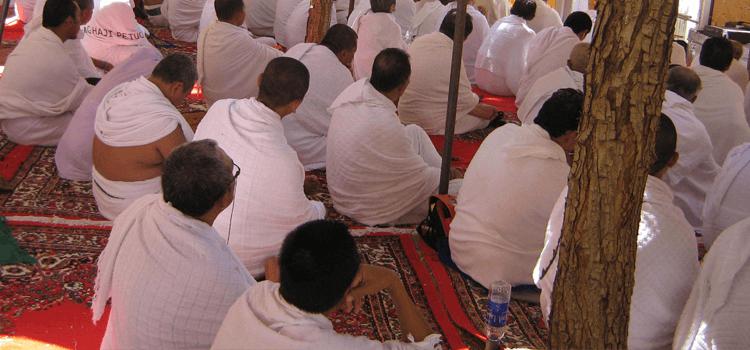
Harming or killing animals, including insects, is not allowed while in Ihram. Even if insects are annoying, they should be removed gently rather than killed. Hunting or assisting in hunting is also strictly forbidden.
If an animal or insect causes discomfort, pilgrims can move away or brush it off without causing harm. This rule teaches compassion for all creatures, reinforcing the peaceful and respectful nature of Ihram.
Mistake 9: Wearing Perfumed Laundry or Lotions
Many people wash their Ihram clothes with scented detergents or fabric softeners before travel, unaware that the fragrance remains in the fabric. This makes their Ihram invalid once they wear it after entering the sacred state.
To prevent this, pilgrims should wash Ihram clothes using unscented soap or plain water. Similarly, avoid scented lotions or oils, even if the scent is mild. Being mindful of such details helps maintain a pure state throughout the pilgrimage.
Mistake 10: Covering the Feet Improperly
Men should not wear footwear that covers the ankles or the top part of the foot. Closed shoes or socks are not permitted in Ihram. Instead, sandals or slippers that leave the ankles and upper feet exposed are recommended.
Women, however, can cover their feet completely with socks or shoes. Understanding this difference ensures compliance with fiqh guidelines and prevents unnecessary confusion or mistakes during travel.
Mistake 11: Forgetting to Make the Intention
Intention (niyyah) is a fundamental part of Ihram. Without it, Ihram is incomplete, even if the garments are worn. Some people put on the clothes but forget to make a verbal or mental intention before reciting the talbiyah.
To avoid this, pilgrims should consciously make the intention in their hearts and, if possible, say it aloud before reciting “Labbayk Allahumma Labbayk.” A sincere intention aligns the heart and soul with the purpose of the journey.
Mistake 12: Using Harmful Language or Gossip
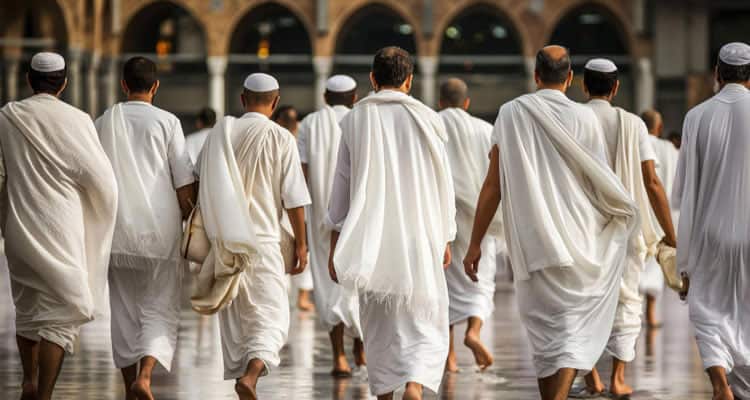
In Ihram, every word matters. Speaking negatively about others, gossiping, or using offensive language goes against the spirit of pilgrimage. These habits may not invalidate Ihram but do diminish its reward and blessings.
Pilgrims should focus on dhikr (remembrance of Allah), Quran recitation, and supplication instead of idle talk. This practice keeps the mind peaceful and spiritually connected to the purpose of Hajj and Umrah.
Mistake 13: Neglecting Cleanliness and Hygiene
While perfume is prohibited, cleanliness remains essential. Some pilgrims mistakenly avoid washing or brushing their teeth, thinking it might break Ihram. In reality, staying clean is part of Sunnah.
Pilgrims can use unscented soaps, toothpaste, and wipes. Keeping the body clean ensures comfort and prevents illness during the physically demanding rituals. The Prophet Muhammad (peace be upon him) encouraged hygiene as part of faith.
Mistake 14: Forgetting to Maintain Modesty
Modesty is central to Ihram. Some people wear clothing that is too revealing or fail to adjust their Ihram properly, especially in windy conditions. Men must ensure their lower cloth covers the navel to below the knees, and women should dress modestly without adornment.
Modesty is not only about clothing but also behavior. Pilgrims should lower their gaze, avoid loud laughter, and maintain a respectful demeanor throughout the journey.
Mistake 15: Ignoring the Rules When Exiting Ihram
After completing the necessary rituals such as Tawaf, Sa’i, and sacrifice, pilgrims exit Ihram. However, some do so prematurely, removing the garments before fulfilling all conditions. This invalidates the act and may require expiation.
Before removing Ihram, ensure that all required steps are done according to the specific type of pilgrimage being performed. Consulting a knowledgeable scholar or guide can help confirm when it is permissible to exit Ihram.
The Importance of Knowledge Before the Journey
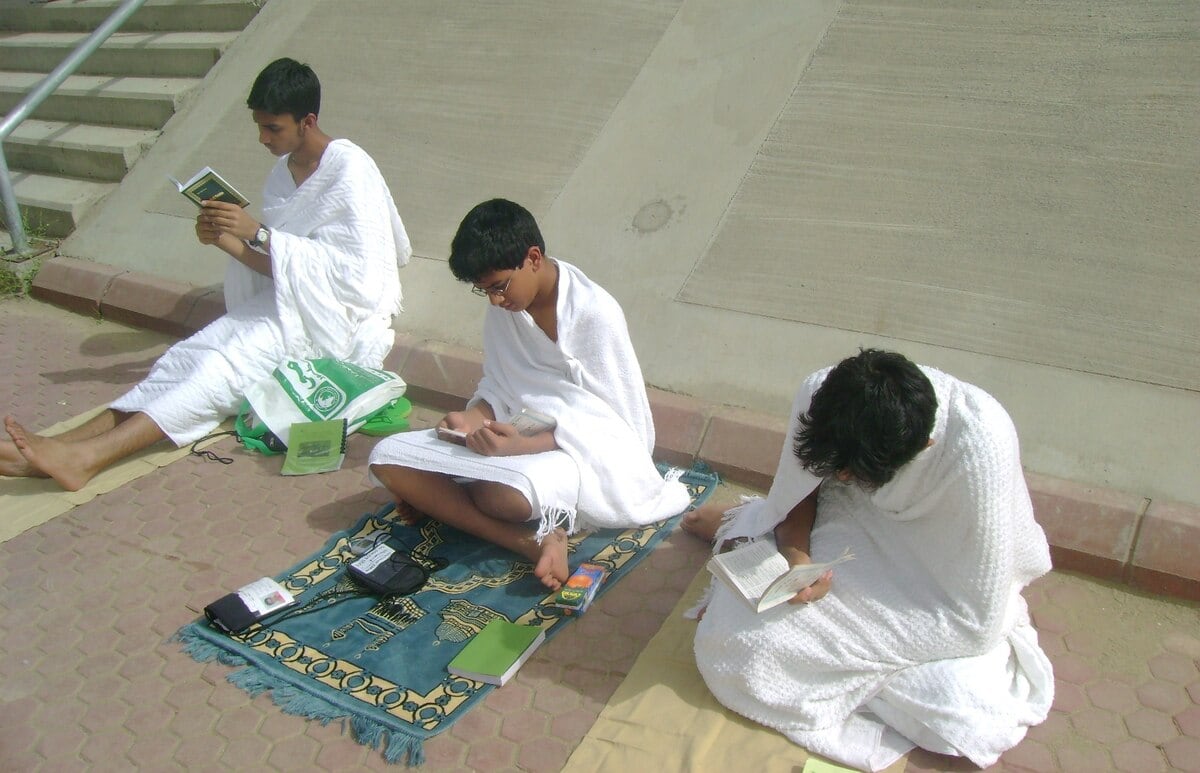
The Prophet Muhammad (peace be upon him) said, “Whoever Allah wishes good for, He gives them understanding of the religion.” Learning about Ihram and its rules before traveling prevents errors and anxiety later.
Attending pre-Hajj or Umrah seminars, reading fiqh guides, and consulting scholars help pilgrims understand the rulings clearly. When knowledge is combined with intention and patience, the journey becomes spiritually rewarding and easier to manage.
The Benefits of Observing Ihram Correctly
Following the rules of Ihram brings immense spiritual benefits. It purifies the heart, disciplines the body, and strengthens faith. The restraint taught during Ihram builds patience, self-control, and empathy for others.
Moreover, observing Ihram correctly ensures that the pilgrimage is accepted and rewarded by Allah. Every act of care and obedience during Ihram reflects a believer’s sincerity and devotion, leading to spiritual growth and forgiveness.
The Connection Between Ihram and Unity
Ihram also symbolizes unity among Muslims. When millions of people from different cultures and backgrounds wear the same simple clothing and recite the same prayers, it demonstrates the equality and brotherhood that Islam teaches.
This collective act of humility reminds every pilgrim that worldly distinctions hold no value before Allah. It builds a sense of compassion and togetherness, reinforcing the idea that all believers are one community united by faith.
Practical Tips to Avoid Ihram Mistakes

Preparation is the key to avoiding mistakes. Pilgrims should pack unscented products, learn how to wear Ihram correctly, and keep a small checklist of prohibitions as a reminder. Asking questions and seeking guidance is better than assuming and making errors.
Staying patient and calm also helps avoid many mistakes. Crowds, delays, and discomfort are part of the pilgrimage experience, but enduring them with gratitude brings greater spiritual reward.
Maintaining Focus During Ihram
Ihram is a time to disconnect from worldly concerns and focus entirely on worship. Pilgrims should use this time for reflection, remembrance, and supplication. Choosing the right Umrah Packages can also help ensure a peaceful and well-organized journey, allowing pilgrims to avoid distractions like excessive photography or phone use and keep their minds present in the moment.
Every step in Ihram is an opportunity to draw closer to Allah. The more focused a pilgrim remains, the deeper the spiritual transformation will be by the end of the journey.
Learning from the Sunnah
The Prophet Muhammad (peace be upon him) provided the perfect example of how to perform Ihram and pilgrimage. Following his Sunnah ensures that every act aligns with the true purpose of the ritual.
Reading about his Hajj and the guidance he gave his companions helps modern pilgrims perform their rites with confidence and sincerity. Remembering that he too faced challenges during Hajj inspires patience and humility.
Final Reflections on Ihram

Ihram is more than a ritual; it is a spiritual contract between the believer and Allah. Every restriction has wisdom behind it, teaching discipline, mindfulness, and equality. Avoiding mistakes is not about fear of penalty, but about preserving the sanctity of this sacred state.
Pilgrims who respect the rules of Ihram experience a journey that is not only physically complete but spiritually enlightening. They return home with renewed faith, purified hearts, and a deeper connection to their Creator.
Conclusion
Ihram represents purity, unity, and obedience to Allah. Avoiding common mistakes allows pilgrims to fully embrace its spiritual meaning and perform their pilgrimage correctly. By learning the rules, staying mindful, and maintaining patience, every Muslim can experience the true beauty of Hajj and Umrah.
Ultimately, Ihram reminds us that in the presence of Allah, all worldly differences disappear. What remains is faith, humility, and devotion — the essence of a pilgrim’s heart.
Tags: avoiding Ihram errors, Hajj advice, Hajj and Umrah guide, Hajj guide, Hajj mistakes, Hajj preparation, how to wear Ihram, Ihram clothing, Ihram dos and don’ts, Ihram mistakes, Ihram rules, Ihram violations, Islamic fiqh, Islamic travel guide, Pilgrimage Tips, spiritual journey, umrah advice, Umrah guide, Umrah mistakes, Umrah preparation
Similar Blog & News
Our curated content will ensure you’re well–prepared and inspired every step of the way.

